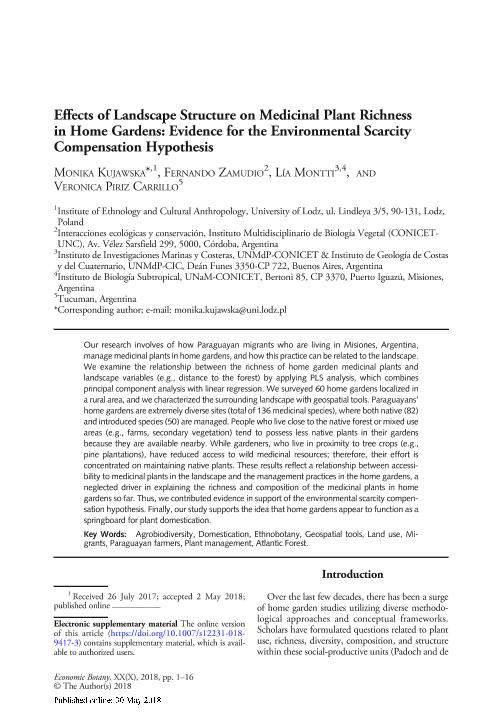Mostrar el registro sencillo del ítem
dc.contributor.author
Kujawska, Monika
dc.contributor.author
Zamudio, Fernando

dc.contributor.author
Montti, Lia Fernanda

dc.contributor.author
Piriz Carrillo, Veronica Raquel

dc.date.available
2019-11-12T14:46:14Z
dc.date.issued
2018-05-30
dc.identifier.citation
Kujawska, Monika; Zamudio, Fernando; Montti, Lia Fernanda; Piriz Carrillo, Veronica Raquel; Effects of landscape structure on medicinal plant richness in home gardens: Evidence for the environmental scarcity compensation hypothesis; Springer; Economic Botany; 72; 2; 30-5-2018; 150-165
dc.identifier.issn
0013-0001
dc.identifier.uri
http://hdl.handle.net/11336/88610
dc.description.abstract
Our research involves of how Paraguayan migrants who are living in Misiones, Argentina, manage medicinal plants in home gardens, and how this practice can be related to the landscape. We examine the relationship between the richness of home garden medicinal plants and landscape variables (e.g., distance to the forest) by applying PLS analysis, which combines principal component analysis with linear regression. We surveyed 60 home gardens localized in a rural area, and we characterized the surrounding landscape with geospatial tools. Paraguayans’ home gardens are extremely diverse sites (total of 136 medicinal species), where both native (82) and introduced species (50) are managed. People who live close to the native forest or mixed use areas (e.g., farms, secondary vegetation) tend to possess less native plants in their gardens because they are available nearby. While gardeners, who live in proximity to tree crops (e.g., pine plantations), have reduced access to wild medicinal resources; therefore, their effort is concentrated on maintaining native plants. These results reflect a relationship between accessibility to medicinal plants in the landscape and the management practices in the home gardens, a neglected driver in explaining the richness and composition of the medicinal plants in home gardens so far. Thus, we contributed evidence in support of the environmental scarcity compensation hypothesis. Finally, our study supports the idea that home gardens appear to function as a springboard for plant domestication.
dc.format
application/pdf
dc.language.iso
eng
dc.publisher
Springer

dc.rights
info:eu-repo/semantics/openAccess
dc.rights.uri
https://creativecommons.org/licenses/by-nc-sa/2.5/ar/
dc.subject
AGROBIODIVERSITY
dc.subject
ATLANTIC FOREST
dc.subject
DOMESTICATION
dc.subject
ETHNOBOTANY
dc.subject
GEOSPATIAL TOOLS
dc.subject
LAND USE
dc.subject
MIGRANTS
dc.subject
PARAGUAYAN FARMERS
dc.subject
PLANT MANAGEMENT
dc.subject.classification
Otras Ciencias Biológicas

dc.subject.classification
Ciencias Biológicas

dc.subject.classification
CIENCIAS NATURALES Y EXACTAS

dc.title
Effects of landscape structure on medicinal plant richness in home gardens: Evidence for the environmental scarcity compensation hypothesis
dc.type
info:eu-repo/semantics/article
dc.type
info:ar-repo/semantics/artículo
dc.type
info:eu-repo/semantics/publishedVersion
dc.date.updated
2019-10-24T19:10:22Z
dc.identifier.eissn
1874-9364
dc.journal.volume
72
dc.journal.number
2
dc.journal.pagination
150-165
dc.journal.pais
Alemania

dc.description.fil
Fil: Kujawska, Monika. University of Lodz; Polonia
dc.description.fil
Fil: Zamudio, Fernando. Consejo Nacional de Investigaciones Científicas y Técnicas. Centro Científico Tecnológico Conicet - Córdoba. Instituto Multidisciplinario de Biología Vegetal. Universidad Nacional de Córdoba. Facultad de Ciencias Exactas Físicas y Naturales. Instituto Multidisciplinario de Biología Vegetal; Argentina
dc.description.fil
Fil: Montti, Lia Fernanda. Consejo Nacional de Investigaciones Científicas y Técnicas. Centro Científico Tecnológico Conicet - Mar del Plata. Instituto de Investigaciones Marinas y Costeras. Universidad Nacional de Mar del Plata. Facultad de Ciencias Exactas y Naturales. Instituto de Investigaciones Marinas y Costeras; Argentina
dc.description.fil
Fil: Piriz Carrillo, Veronica Raquel. Instituto de Biologia Subtropical (ibs); Argentina
dc.journal.title
Economic Botany

dc.relation.alternativeid
info:eu-repo/semantics/altIdentifier/url/https://link.springer.com/article/10.1007/s12231-018-9417-3
dc.relation.alternativeid
info:eu-repo/semantics/altIdentifier/doi/https://doi.org/10.1007/s12231-018-9417-3
Archivos asociados
